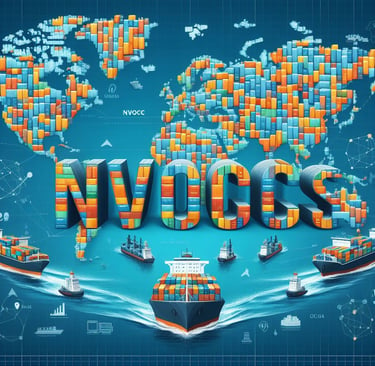Demystifying NVOCCs: A Guide to Non-Vessel Operating Common Carriers
This page explores the world of Non-Vessel Operating Common Carriers (NVOCCs), a crucial yet often misunderstood player in international shipping. We'll delve into who they are, their role in the supply chain, how they operate, a glimpse into the future of NVOCCs, and showcase some of the top global companies.
Who Are NVOCCs?
NVOCCs, unlike traditional shipping companies, don't own or operate their own vessels. However, they act as common carriers, offering ocean freight transportation services to shippers. They essentially function as intermediaries between shippers and vessel operating common carriers (VOCCs) that own and operate the container ships.
They bulk-buy space on ocean carriers and then sell it to shippers like you at potentially more competitive rates.


What Do NVOCCs Do?
NVOCCs play a vital role in facilitating international trade by offering a range of services to shippers:
Consolidation: They consolidate smaller cargo shipments from different clients into full container loads (FCLs) for cost-effective transportation on VOCC vessels.
Freight Forwarding: NVOCCs often handle many aspects of freight forwarding, including customs clearance, documentation, cargo insurance, and inland transportation arrangements.
Negotiating Rates: They negotiate competitive freight rates with VOCCs on behalf of their clients, leveraging their buying power.
Tracking and Visibility: NVOCCs provide shipment tracking and visibility to their clients, ensuring they stay informed throughout the transportation process.
Value-Added Services: Some NVOCCs offer additional services like cargo packing, labeling, and specialized handling for specific types of goods.
How Do NVOCCs Operate?
NVOCCs operate by issuing their own Bill of Lading (HBL - House Bill of Lading) to shippers. This document serves as a contract of carriage between the NVOCC and the shipper, outlining the terms and conditions of transportation. The NVOCC then enters into a separate agreement with a VOCC (using a Master Bill of Lading) to book space on their vessels and handle the actual ocean transportation.
The Future View: A Look Ahead for NVOCCs
The NVOCC landscape is evolving alongside the global shipping industry. Here are some key trends on the horizon:
Growth of E-commerce: The rise of e-commerce will likely drive demand for NVOCC services due to the need for efficient management of smaller cargo shipments.
Increased Specialization: NVOCCs may specialize in specific niches or geographic regions to cater to evolving customer needs.
Focus on Technology: Adoption of digital platforms and automation will be crucial for NVOCCs to enhance efficiency and transparency in their operations.
Top Global NVOCCs:
Several prominent NVOCCs operate worldwide. Here are some leading players (in no particular order):
DHL Global Forwarding (Germany): A major logistics provider with a strong NVOCC presence.
DB Schenker (Germany): A leading global logistics company offering NVOCC services.
C.H. Robinson Worldwide Inc. (USA): A prominent provider of transportation and logistics services, including NVOCC operations.
Expeditors International of Washington Inc. (USA): A global logistics company with a well-established NVOCC business.
Kuehne + Nagel (Switzerland): A leading provider of sea freight, air freight, contract logistics, and NVOCC services.
CEVA Logistics (Switzerland): A global non-asset-based logistics company with a strong NVOCC presence.
Panalpina Welttransport AG (Switzerland): A leading provider of air and ocean freight forwarding services, including NVOCC operations.
Damco (Denmark): A global logistics provider offering NVOCC services (acquired by A.P. Moller-Maersk in 2019).
Remember, this list is not exhaustive. Many regional and niche NVOCCs cater to specific markets and industries.
Conclusion: NVOCCs play a critical role in facilitating international trade by offering cost-effective, flexible, and efficient ocean freight solutions to shippers.
By understanding their functions, operations, and future outlook, you gain valuable insights into the dynamic world of logistics.


